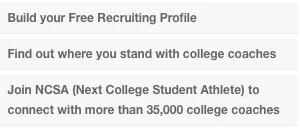Obsession with Baseball Model Has to End
It should not be surprising that college athletics leaders are some of the most vocal proponents of fixing not just the NCAA but also professional leaders. Even if it is pure self interest, framing the problem as beyond just what the NCAA’s rules are is correct. The NCAA might be the 800-pound gorilla when it comes to how athletes are developed, but the NBA and NFL are the elephants in the room that must be addressed.
But that benefit of the doubt, that whatever the motives the interests of conference commissioners are momentarily aligned with the interests of young athletes, is strained when you see some of the solutions proposed. Using the plural is even too generous, since only one solution ever seems to be proposed. The “baseball model” has become the cure for all that ails NBA and NFL draft rules.
The MLB’s draft rules, that prospects who do not turn professional out of high school are not eligible to be drafted again for three years if they enroll at a four-year school, make sense in the context of Major League Baseball. Teams have extensive minor league systems at varying levels. Young players can progress through that system based on ability. Larger scouting networks and a longer history of advanced statistics means keeping track of prospects in all three NCAA divisions, the NAIA, and junior college is easier.
Applying the baseball rule to the NFL is laughable, since the lack of any development system in professional football means virtually no prospects will be drafted. Small rosters, short seasons, and the physical maturity needed to handle the violence of the game mean teams simply cannot afford to stash away players drafted out of high school for two to four years. It is an illusory option, made even a bit worse if the NFL continued to require players to declare for the draft, creating a thicket high school seniors would need to navigate to keep their eligibility.
Although subject to intense debate, we know that at least some high school graduates are ready for the NBA. We also know that plenty of prospects are ready after a year or two years in college. While this means that the possibility of being drafted and earning a professional contract in basketball is greater than zero (not in evidence in football), the baseball model still does not solve the philosophical problem with the current draft rules. Players (albeit fewer) will still be kept out of the NBA not because they are not good enough but because they have not spent enough time doing something else.
The idea that college commissioners can push through this change that the NBA does not want and that the NFL does not have the infrastructure for is magical thinking. Even the capital commissioners seem to believe they have is inflated. Creating a playoff when collegiate commissioners controlled the college football playoff was a piece of cake. But when having to influence even an organization of which they are a member, the recent track record is less than inspiring. No cost-of-attendance stipend and no breakaway or separate NCAA division take the luster off the idea of major conference commissioners are transformational forces.
And so far the willingness of commissioners to make the painful decisions that might force the NBA and/or NFL’s hand seems limited. If the one-and-done system makes a “mockery of the student-athlete”, where is the push to remove the professional exception from the APR? Why not prevent coaches from re-awarding scholarships when players leave early for the pros? And the “nuclear option” of across the board freshman ineligibility is only an effective threat if professional leagues belief the NCAA might actually bring it back.
All of these are terrible for athletes, but if something bigger is at stake, then maybe the ends justify the means. The lack of any ideas beyond expanding MLB draft rules and unwillingness to use tools within the NCAA’s control make this seems less like a top priority and more like just sound and fury. One day the NFL and NBA’s draft rules will change, but the plans of college commissioners to bring about that change in the near future need a lot of work.


